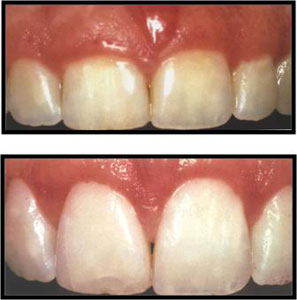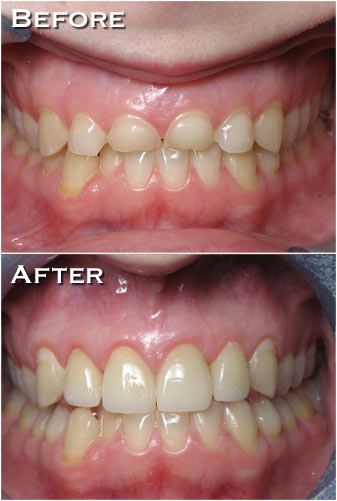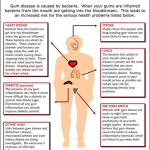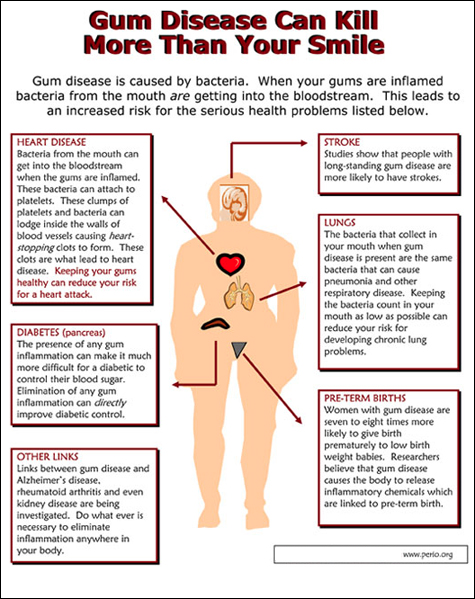Gum Treatments
Soni Dental have expertise and additional training in treating entire-mouth conditions and problems associated with gums. When approaching dentistry with this foundation, your teeth are treated holistically and you can gain a greater understanding of the forces at play.
Book an appointment today.
Information about gum treatments.
Click on the links to open more information about the treatment type.
What is Gum Disease?

In a broad sense, the term 'gum disease' — or periodontal disease — describes bacterial growth and associated destruction of the tissue surrounding and supporting the teeth.
It all begins with plaque, which is a biomass of bacteria which is continually growing on your teeth and gums. When it accumulates to excessive levels, it can not only harden into a substance called tartar (calculus), but it also irritates the gums and surrounding tissues.
Tartar cannot be removed by a toothbrush thus it is recommended to brush twice a day to disrupt and remove this plaque before it becomes hard, and to maintain regular visits to a dentist to perform a professional cleaning to remove it.
If not removed, eventually the gums and tissues can be so inflamed and irritated that they actually start to deteriorate. This stage is known as 'gingivitis'. One of the earliest signs of gingivitis is when the gums bleed during brushing or flossing.
After this point, the disease can progress to periodontitis. This is when the deterioration progresses to the inner layers of gum and bone. As the gums and bone deteriorate, they shrink away from the tooth, causing deep pockets to form next to your tooth.
These pockets can collect more plaque, debris and easily become infected. The body tries to fight the infection by sending destructive enzymes to the area - hoping to destroy the bacteria. However it ends up causing damage to your own tissues resulting in further bone loss and further loss of tooth support.
Eventually so much support is lost that the ultimate outcome is complete tooth loss.
Signs and Symptoms
Many people are completely unaware of periodontal or gum diseases because they do not actually cause any significant pain. Often it isn't until they visit the dentist that they can be told that they have a chronic gum disease.
Although the symptoms of periodontal disease often are subtle, there are a few warning signs to look out for:
- Bleeding Gums during flossing/brushing.
- Red, swollen or tender gums
- Persistent bad breath or bad taste in the mouth
- Receding gums
- Food getting stuck easily between teeth
- Loose or shifting teeth
- Sensitive teeth
Treatment
The primary goal of periodontal treatment is to control any infection that exists and to halt progression of the disease.
We may recommend a change in eating habits, brushing techniques or flossing techniques. The treatment will also involve conservative non-surgical therapy such as scaling, cleaning and root planing to control the growth of bacteria. In some advanced cases there may be surgical therapy options to restore tissues to prevent further loss.
Treatment is heavily reliant on home-care options, self-managed improvements and cooperation with the dentist's advice.

All About Gum Rejuvenation Procedures
The term ‘Gummy Smile’ is commonly used to refer to a smile which shows a lot of gum or not a lot of the white enamel part of the tooth, often making the teeth appear shorter and squarer than they actually are or should be.
 A gum lift procedure can be performed to remove excess gum and expose more of the natural ‘hidden’ white tooth. Removal of excessive gum and reshaping of the gum line can give a fuller, more aesthetically pleasing smile, in most cases giving you a younger and more youthful appearance.
A gum lift procedure can be performed to remove excess gum and expose more of the natural ‘hidden’ white tooth. Removal of excessive gum and reshaping of the gum line can give a fuller, more aesthetically pleasing smile, in most cases giving you a younger and more youthful appearance.
A Gum Lift is sometimes described as a ‘crown lengthening’ procedure and results in a longer looking tooth. This procedure may also be recommended before a tooth is prepared for a crown if the tooth is too short or the filling material is below the gumline.

The Management and Treatment of Bad Breath
Our dentist Dr Sunil Rajdev is a trained and certified "Bad Breath Treatment Practitioner". Having completed auxiliary training in the management and treatment of bad-breath related conditions.
So what exactly IS bad breath?
Bad breath is when there is a higher than normal level of Volatile Sulfur Compounds (VSC's) in a person's breath. These chemicals smell unpleasant and can affect relationships, confidence and self esteem.
 The main causes of these VSC's are bacterial growth and decay, but dietary or medical factors can play a role as well.
The main causes of these VSC's are bacterial growth and decay, but dietary or medical factors can play a role as well.
How is it treated?
Our dentists are trained to treat the entire body and not look at the teeth in isolation. We will conduct a comprehensive examination to determine the cause of your bad breath and together find the most appropriate treatment option for you.
Ultimately, you are in control of your oral health and with the assistance of one of our dentists we are able to completely treat these kinds of symptoms. This means you can breathe more freely, not have to feel embarrassed any longer, and build the social and business relationships without worrying about it!
Call us now to schedule an appointment or to talk to one of our dentists to discuss your options.
The dentists at Soni Dental have a special interest in gum diseases and gum related conditions. They also have post graduate qualifications helping them to treat your teeth in a holistic manner, taking into account all factors affecting your health.
New research shows how strong the connection is between bacteria in gum diseases and a number of other conditions that can impact your health. These findings are shocking and once again stress the importance of good oral health and a holistic approach to dental treatment.
When gum conditions are experienced for a prolonged period, various chemicals are produced which can potentially enter the bloodstream, cause and/ or contribute to the development of systemic diseases and conditions.
Some of the conditions that gum disease can implicate are:
Heart related problems.
Bacteria in the mouth sit extremely close and inside the gums. Gums are naturally 'pink' because the blood is so extremely close to the surface. In gum related conditions, bacteria and their products can actually enter the bloodstream and travel to the heart. These can lead to heart attack, infective endocarditis, and other heart problems.
Strokes
Similar to the process of heart attacks, gum disease leads to a higher risk of stroke. Bacteria and bacterial products enter the blood stream and adhere to platelets which form clots or lodge on the walls of blood vessels. This can cause problems in other parts of the body such as the brain.
Diabetes
New research has shown that gum conditions has a two-way relationship with diabetes. Scientists were already aware that people with diabetes were at higher risk of gum diseases, however they are now also aware that people with gum conditions are also at higher risk of diabetes! When people have periodontal disease it can increase blood sugar. Increasing the length of time where the body functions with a high blood sugar makes it more difficult for people with diabetes to control their own blood sugar levels and puts them at higher risk for diabetic complications.
Osteoporosis (bone conditions)
Researchers have uncovered a link between bone loss and periodontal conditions. As periodontal conditions progress they can lead to bone loss and ultimately teeth lose their surrounding structures and thus also leads to tooth loss.
Bacteria can also travel to artificial joint prostheses and cause infections and failure of the prosthesis.
Lung Conditions
Research has found that bacteria in the mouth can be inhaled into the lungs during normal breathing. Bacteria can actually become established in lungs and increase the risks of lung diseases such as pneumonia and other lung infections.
Conditions with the Kidneys
Very recently, new research has emerged identifying a relationship between kidney disease and gum diseases. Initial findings are showing a potentially similar mechanism as that seen in heart conditions. With studies showing that treating periodontal and gum disease could actually slow the progression of kidney diseases. It is very interesting data and the medical and dental community are watching new studies attentively.
Cancer
Men with gum disease were found to be 49% more likely to develop kidney cancer, 54% more likely to develop pancreatic cancer and 30% more likely to develop blood cancers.
Pregnancy
Certain studies have shown that the risk of a premature birth was actually 3 to 8 times higher for mothers with periodontal diseases. There are systemic interactions with the bacteria in your mouth and the hormonal balances required for a healthy birth.
In addition to the chronic inflammation triggered in response to the oral pathogens, periodontal infection may also result in tooth loss, oral pain, poor mastication, and several nutritional defects and may also be expected to be related with Alzheimer’s disease and dementia.
Treatment
Gum disease actually has a secondary role in many of these medical conditions in that they make it more difficult and complicated to treat. Cardiovascular disease, pulmonary disease, diabetes, orthopedic replacement, kidney disease, cancer, rheumatoid arthritis, and pregnancy can all be complicated by bacteria from the mouth.
If you have noticed gums that bleed when brushing, or flossing. Or you are concerned about any of the above medical conditions, then seeing a dentist who is trained appropriately in these systemic medical conditions is vitally important for your health.
When we work together with you to alleviate your concerns and ensure that we can get your oral health to a satisfactory level, then we can help reduce the health risks that you may be susceptible to.
Get in touch with us to discuss any concerns.
Need An Appointment?
Our friendly staff would love to help you with your dental needs! Contact us today.




